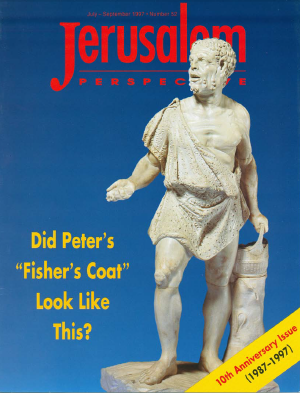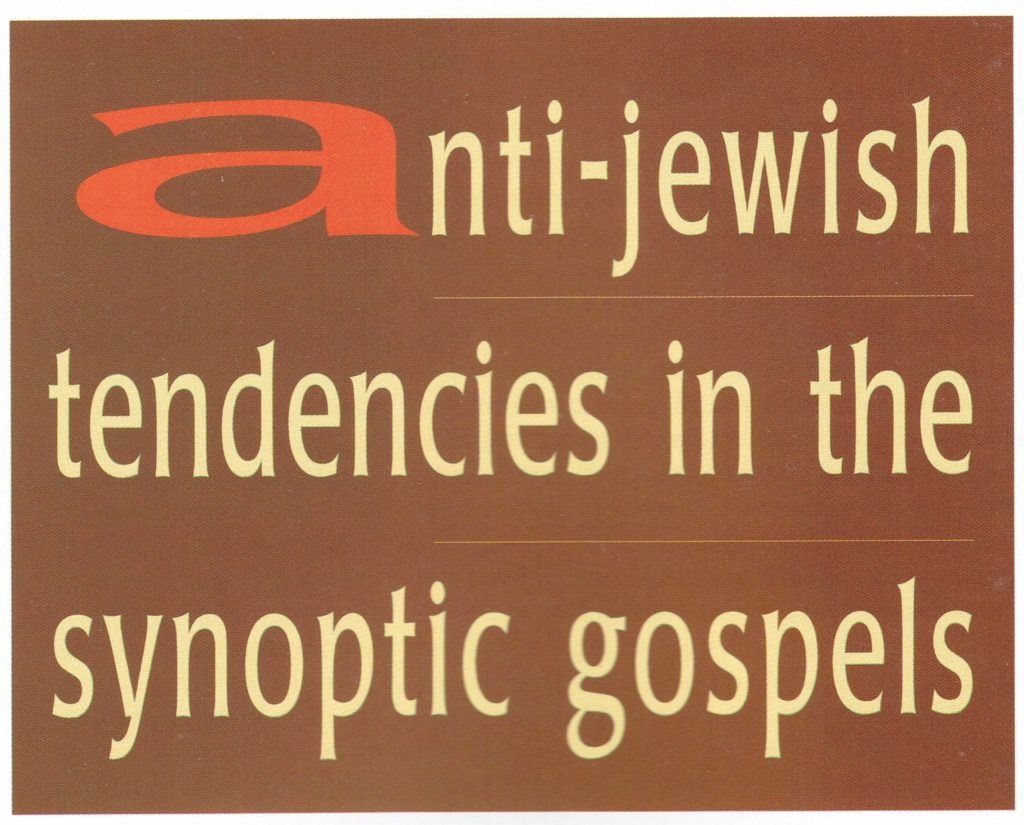Comment from William Yarchin (Azusa Pacific University, Azusa, California, U.S.A.) that was published in the “Readers’ Perspective” column of Jerusalem Perspective 52 (Jul.-Sept. 1997): 8-9.
The stimulating article on “Anti-Jewish Tendencies in the Synoptic Gospels” by R. Steven Notley in issue 51 of Jerusalem Perspective was of great interest to me not only for what it said but especially for what it left unsaid. (Please understand that as I share my thoughts I by no means intend to imply any endorsement of anti-Jewishness, nor any disrespect for the scholars to whom I refer.)
Let us for the moment accept what Notley and others argue, that in the gospels we find evidence of anti-Jewish sentiment. When Notley states that these are sentiments which “reflect little of Jesus’ own thinking or experience,” he presents a conclusion that will stand or fall on the strength of the evidence and argument.
But with this and other historical conclusions regarding the words and teachings of the historical Jesus, the Jerusalem School scholars leave unanswered a huge hermeneutical question, which lies implicit in these lines from Notley: “It is the duty of those working to hear clearly the words of Jesus to ensure that such distorted [anti-Jewish] perceptions do not become identified with the historical Jesus.” Here a distinction is recognized between on the one hand the historical Jesus, whose authentic words presumably contained nothing anti-Jewish, and on the other hand the canonical Jesus, to whose teachings the “theology of replacement” is attributed. What Notley does not tell us is the hermeneutical criterion that justifies preference for his reconstructed teaching of Jesus over the version that the canon has delivered to us.
Let me make this point with a similar, broader example. From time to time scholars of the Jerusalem School will offer in books or articles fascinating insights into a saying or parable of Jesus as it would have been understood by the audience on the scene when Jesus addressed them in Hebrew. But the actual historical scene of Jesus speaking in Hebrew is not what the gospels present to the reader. Rather, the only record we have of Jesus’ teaching are highly edited Greek versions, in which the sayings and parables of Jesus have been intentionally arranged in ways that serve certain rhetorical purposes the gospel writers had in mind. Jerusalem scholars of course recognize that the gospels are the product of editorial activity, but they seem to dismiss that editorial activity as an irrelevant, secondary accretion to the Jesus tradition. What justifies that assumption?
Implicit in the Jerusalem School’s approach to the words of Jesus is that those words have authority for faith primarily as they came forth from Jesus’ mouth and were remembered and recorded in Hebrew. Little, if any, recognition is given to the authority God might have imbued into the tradition process as it continued by preserving those words in Greek and arranging those teachings into at least the three different editorial frameworks we call the synoptic gospels. This is essentially the same oversight found in the various quests for the historical Jesus that the past 150 years of European and American New Testament scholarship have witnessed.
Tradition processes of the sort that produced the Bible invariably will preserve a variety of stances on single issues. From Notley’s work we learn that the final product of Scripture contains two stances on Jews: one free from anti-Jewish attitudes, and another that blames the Jews for the death of Jesus. This is similar to the simultaneous presence of fiercely anti-pagan theology canonized as Old Testament Scripture (in, e.g., Numbers, Deuteronomy, and Joshua) alongside other canonical works far more theologically open to the heathen (e.g., Jonah). Both are voices present in Scripture; that is an established fact, and the work of Notley reminds us of that fact. But that very fact makes necessary a clear, compelling, and canonically sensitive criterion by which we justify our choice to listen to the one voice instead of the other. The criterion implied by New Testament scholars of the Jerusalem School seems to be historical; that is, the historically earlier element in Scripture is the one that is normative. Given the evidence that later biblical editors played an enormous role in the shaping of canonical Scripture, the historical criterion is in need of justification.
For all the considerable historical importance of the work done by members of the Jerusalem School, the value of that work for interpreting Scripture within the context of faith remains in question as long as this issue of the hermeneutical criterion remains unaddressed. Adding this key hermeneutical question to the tasks pursued by the School is, I feel, worth serious consideration.
Steven Notley responds:
Thank you for your well thought out critique of my article. You have raised a number of important points. I am sorry that space will not allow me to respond to them in full.
In your comment regarding the hermeneutical questions raised by the work of the Jerusalem School, you have struck upon what I consider one of our most serious failings. There as yet exists no single volume with a full and clear presentation of the working methodology of the Jerusalem School, especially one directed to other scholars working in the field. It is my hope that in the near future a cooperative effort can be made by scholars of the Jerusalem School to fill this gap and lay a foundation for future research.
Individual Jerusalem School scholars bring their own perspectives to their study; however, I have observed three underlying assumptions that distinguish the Jerusalem School’s work: first, that Hebrew was the primary teaching language of Jesus. He likely also knew Aramaic and Greek, but when looking for the linguistic milieu of the Lord’s sayings, a working knowledge of post-biblical Hebrew is imperative. Second, that Jesus lived and ministered within a Jewish cultural and religious context. Sometimes his words and the writings of the gospel writers assume that we are familiar with that world. Sadly, that is often not true. Third, that Luke was written first and was followed by Mark and Matthew. Thus, the Jerusalem School scholars have concluded that the literary relationship of the synoptic gospels is not that which is widely held. Unlike many scholars who view Luke as merely a tertiary reworking of Mark with little historically reliable material, we are of the opinion that Luke possesses primitive material which can shed light on the life of Jesus. Matthew was written last of the synoptic gospels, but his chronological position should not be taken to mean that his gospel is without valuable historical information. All of the gospel material must be taken into account in order to gain a clear picture of the life of the Lord.
In light of the above, while I recognize that the canonical gospels are in Greek, I do not share your opinion that “the only record we have of Jesus’ teaching” are “highly edited Greek versions.” Your depiction blurs the individual literary state of the various gospels.
It has long been recognized that the gospels bear the mark of the Semitic world in which they were born. I would submit that these Greek versions reflect one or more earlier Hebrew accounts of Jesus’ life which were translated and have become more polished in their Greek style as the tradition developed.
Your suggestion that we “seem to dismiss that editorial activity as an irrelevant, secondary accretion to the Jesus tradition” also misses the mark a bit. Moreover, I cannot agree with your characterization of our gospels as merely “three different editorial frameworks.” Nor are the divergent theological views found in the Old Testament relevant at this point. From a literary standpoint, a more relevant parallel might be the relationship of the books of Samuel and Kings with Chronicles.
In any historical study utilizing the gospels, it is important first to establish what Jesus said, before we can know what Jesus meant. That need sometimes necessitates determining (if possible) a saying’s earliest literary stage. By the way, I do not subscribe to the view of redaction criticism which holds that each gospel writer merely amended the gospel stories to serve his own particular theological or ecclesiastical needs. If such were the case, you would be right that all that remains for today’s reader is an inspired process—without any visible historical figure.
Instead, I place great importance upon the historical Jesus who stands behind our canonical Scriptures and upon our ability to see and hear him. My work only attempts to peer through the evidence we have in an attempt to understand Jesus more clearly. The positive attitude of the Jerusalem School scholars concerning the ability to discern the actual sayings and events in the life of Jesus should be noted. It is often overlooked that the Jerusalem School’s research stands in stark contrast to that of the Jesus Seminar, whose members, on the whole, feel that there is very little historically reliable material to assist us in determining what Jesus said and did.


































































































